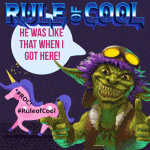On – 20 Feb, 2018 By Brook H
https://popcultureuncovered.com/2018/02/20/tabletop-tuesday-its-ok-to-love-dd/
A month ago, I wrote an article about how there’s more to roleplaying games than Dungeons & Dragons. This piece was in response to a common question: “Why do you play stuff other than D&D?”
Although my discussion brought a lot of attention, there were some who took umbrage with my comparison of D&D to fast food. No matter how many times I emphasized that I like the game or that the comparison was about its ubiquitous and accessible nature, some fans took the comparison (and whole article) as an attack.
I suppose I could have chosen another analogy, although I’m sure someone would still take it the wrong way. If I compared D&D to Starbucks, because there’s a game on every corner, someone would say, “You’re calling D&D overpriced and bourgeois!”
So, instead, I’m going to explain the reasons I like the game. This article is also to answer a similar question to above, but from the other side: “Given all the choices, why do you still play D&D?”

Familiar Settings and Themes
Let’s face it; when the average person thinks “fantasy,” they envision much of what you find in D&D. I’m not saying D&D originated the concepts, but they’ve brought these aspects together and marketed them to a broader audience.
Medieval towns, monsters in the wilds, dragons hoarding treasure, exploring ancient dungeons, etc.; these may have their roots elsewhere, but many know them through D&D. Not to mention the stereotypical adventuring party: armor-clad warrior, nimble thief, swift archer, bookish wizard, and a holy man of some sort.
I love D&D because it’s familiar, the classic Euro-centric fantasy that we’ve all grown up on, whether in books, television, or movies. There’s little confusion over what a dwarf or troll is, we can easily envision a loud tavern or a ruined castle, and we can usually expect a quest of some sort.
What I also love is this “base” fantasy standard allows you to add new variations, while still retaining some familiarity. When you say, “this game is D&D, except set in a savage desert world where magic is rare and hated, but psychics abound and there are mantis-people,” then most people still get the gist.
That aspect is why D&D has had so many beautiful settings over its life, from the more classic Greyhawk or Forgotten Realms to the stranger Eberron or Planescape. You can use a pre-made world, create your own, etc., but there’s always something familiar when you sit down at the table.

Classic Mechanics and Style
I’ve seen a lot of people hate on the game mechanics of D&D or its approach to gaming and storytelling. Some critique its dependence on dice rolls or cliché “get gold and level up” character development.
I see nothing wrong, however, with these mechanics or style; I think characters with stats and levels work well because you’re playing a game. Not everything has to be about abstract ideas, broadly applied dice rolls, or cooperative storytelling – sometimes you just want to game.
Not to mention, this reliance on character sheets and d20s doesn’t mean you can’t have any of that, or that it’s the end-all to the game. They are a means to an end, a way to add chaos to the tale and to interpret character growth; you can still have profound games or dramatic scenes within the mechanics.
Plus, like the familiar settings and themes, D&D started with a base game and evolved, branched off, and created a rainbow of variations. If you don’t like one edition, you have a multitude to choose from, not to mention cousin games or various hacks.
Far too many people think of D&D as merely reactive dice rolling and experience points when there is so much more to the game. Whether the new 5th edition, the classic 3.5 (or Pathfinder), or the latest “old school” Black Hack, there are a multitude of ways to play D&D and still have it feel like D&D.

D&D… D&D, Everywhere
As the original and longest running RPG, D&D is synonymous with roleplaying games. Not to mention the decades of marketing, whether under TSR, WotC, or Hasbro, that puts it front and center.
If you’re new to roleplaying games, trying to get into the hobby or find a pick-up game, there is probably no easier game to discover. D&D makes up the vast majority of games at stores, conventions, colleges, etc.
This presence makes it the perfect introduction, from the youngest gamers to those who just never thought to try until later in life. D&D is the gateway drug of RPGs, the one that gives most people their first taste of pen, paper, and dice.
Maybe someone’s tastes change and they want something different; maybe people continue to enjoy the flavor they first enjoyed. Either way, everyone needs that starting point, and D&D is the most well-known and universal RPG.
Whether you consider the corporate nature of the game (or its overabundance) a good or bad thing, you can’t deny – D&D is everywhere, and that makes it easily accessible.

Like my other article, I want to emphasize there is no “good” or “bad” game (minus a few exceptions we won’t link to here). Gaming is not zero-sum, and you can love D&D and other games as well; each RPG, edition, etc. is good for whatever you want.
D&D is a fantastic game with a long history, a multitude of settings, fun mechanics, and plenty of gaming opportunities. I may enjoy different RPGs for their subject material or storytelling techniques, but if I want classic fantasy-adventure gaming, then I can think of no better game.
Get out those polyhedral dice, pick your favorite race and class, and start your quest into wild regions and dark caverns. Forget the haters and critics because it’s perfectly fine to love Dungeons & Dragons.
https://popcultureuncovered.com/2018/02/20/tabletop-tuesday-its-ok-to-love-dd/
On – 20 Feb, 2018 By Brook H





